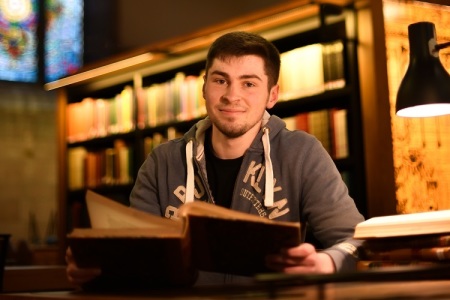Divinity student becomes first to decipher Baptist theologian's 200-y-o sermons

A divinity student has cracked a centuries-old code to become the first person in the world to read documents left behind by Baptist pastor and theologian Andrew Fuller.
Jonny Woods, a third-year undergraduate at the University of St. Andrews in Scotland, has been able to read hundreds of pages of notes written by Fuller after he figured out how to decipher the shorthand for his sermons using a longhand equivalent.
Fuller (1754–1815), the late 18th- and early 19th-century British Baptist pastor, was described by C.H. Spurgeon as “the greatest theologian” of his century. And his influence on American Baptists was said by A. H. Newman to be “incalculable,” according to The Southern Baptist Theological Seminary in Louisville, Kentucky, where the Andrew Fuller Center for Baptist Studies is located.
His first major work, The Gospel Worthy of All Acceptation (1785) “refuted Hyper-Calvinism and laid the theological foundations for the modern missionary movement,” the seminary says of Fuller, who founded the Baptist Missionary Society and worked to spread the Gospel in India.
Reformed theologian and Desiring God founder John Piper says in his book, Andrew Fuller: Holy Faith, Worthy Gospel, World Mission, that Fuller had one “great enemy” he wanted to defeat — "global unbelief in Jesus Christ,” and homed in on the dangers of Sandemanianism and Hyper-Calvinism.
Steve Holmes, head of the School of Divinity at St. Andrews, said hundreds of pages of Fuller’s sermons are held in the archive at Bristol Baptist College, but the famous theologian's notes for the sermons had remained illegible until he found one titled “Confessions of Faith, Oct. 7, 1783,” which was a longhand equivalent to shorthand notes.
“Knowing this was the date of Fuller’s induction into the pastorate of a church in Kettering and that he would have been required to give a confession of faith as part of that service, Holmes wondered if a copy of the confession printed in a biography might help him crack the code,” St. Andrews reports.
After realizing his hunch about the two documents being the same was correct, Holmes recruited Woods as an undergraduate research assistant to help crack the code that had puzzled academics for centuries.
Within weeks, Woods was able to translate the shorthand notes using the longhand version, “allowing him to read two of the most historically significant sermons from the collection,” the university added.
“To be able to read something that no one else has read in more than 200 years is not something I thought I would ever be able to do and it was an incredible moment,” Woods, 21, told the U.K. Times, noting that his hard work eventually “paid off.”
“It is such an honor to be the first person to read Andrew Fuller’s sermons and to allow people to get an insight into this incredible man and the amazing stories he has to share,” he said in an interview with St. Andrews. “I’m excited to continue working on the vast collection of work that he has left to us, in the hope that we can understand more about his thinking and how this developed throughout his ministry.”
“When Jonny told me he could read these documents, it was an astonishing moment,” Holmes said.
“Andrew Fuller stands as the figurehead, the ‘patron saint’ almost, of the church tradition of which I am a part. To be reading words of his that no-one had read since he preached them in 1782 — it’s one of those moments you live for as an academic."
In recognition of his theological work, both the College of New Jersey (1798) and Yale (1805) had awarded Fuller honorary doctorate degrees, but he declined to accept them.
St. Andrews says that translations of the two sermons are now with the Baptist Quarterly and under consideration for publication. Holmes is continuing to edit Fuller’s wider collection of sermons for a major new critical edition of his works.
Follow Melissa Barnhart on Twitter: @MelBarnhart




















